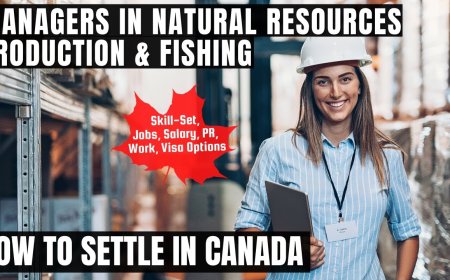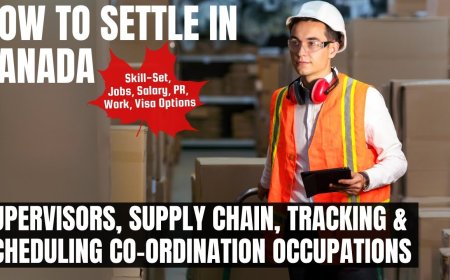Other professional occupations in physical sciences Canada Immigration Overview: Key Insights on Salaries, Employment, and Regional Advantages
Welcome to the pathway to Canada immigration for skilled professionals and trade workers. This guide is specifically tailored for Other professional occupations in physical sciences looking to work and settle in Canada, offering a deep dive into the essential aspects of immigration and employment in this field.
Introduction
Canada is known for its strong economy, vibrant multicultural community, and high standard of living, making it an attractive destination for many professionals looking to advance their careers. In this article, we will be focusing on the career and immigration prospects for Other professional occupations in physical sciences, with a National Occupation Classification code of NOC 2115. We will cover the profile description, main job duties, education, and license requirements, necessary skills, median retirements, salary details, and possible visa options for professionals in this field looking to move and work in Canada. Let's dive into the details and explore the opportunities that Canada has to offer in the field of physical sciences.
What is the Profile Description of a Other professional occupations in physical sciences as per the Canadian National Occupation Classification (NOC) Standards?
Professionals in other physical sciences occupations are responsible for conducting both theoretical and applied research in various fields of physical science. This can include areas such as metallurgy, soil science, and other branches of physical science. These professionals are typically employed by government agencies, educational institutions, and a variety of industrial organizations. Their work involves conducting experiments, analyzing data, and contributing to advancements in the field of physical science.
What are the Main Job Duties of a Other professional occupations in physical sciences in Canada?
- Metallurgists study the properties and production of metals and alloys.
- Soil scientists research the composition, distribution, and evolution of soils.
- Materials scientists investigate the properties, composition, and production of materials like ceramics and composite materials.
- Astronauts command, pilot, or serve as crew members of spacecraft to conduct scientific experiments and research, as well as participate in space missions as mission specialists to maintain spacecraft, install and repair space station equipment, and launch and recapture satellites.
What are the Education, Certifications, and Licensing Requirements to Work as Other professional occupations in physical sciences in Canada?
Individuals pursuing a career in other professional occupations in physical sciences must have a bachelor's degree in metallurgy, physics, chemistry, or a related field. However, for those seeking employment as a research scientist, a master's or doctoral degree is typically necessary. Additionally, advanced degrees in areas such as engineering or medicine, as well as relevant licenses, may be required for certain positions within this unit group.
What Essential Skills are Required for Other professional occupations in physical sciences to succeed in Canada?
To be successful in the profession of other professional occupations in physical sciences, individuals must possess essential skills such as the ability to conduct studies into the properties and production of metals and alloys. They must also be capable of conducting research into the composition, distribution, and evolution of soils, as well as into the properties, composition, and production of materials like ceramics and composite materials. Additionally, professionals in this field should have the knowledge and expertise to command, pilot, or serve as crew members of a spacecraft to conduct scientific experiments and research. They should also be able to participate in space missions to maintain spacecraft, install and repair space station equipment, and launch and recapture satellites. Overall, a successful career in this profession requires a strong foundation in research, analysis, problem-solving, and technical skills.
What is the Median Age and Retirement Age for Other professional occupations in physical sciences in Canada?
The skilled professionals who work in Other professional occupations in physical sciences have a median age of 43.0 years, indicating that they are at a point in their careers where they have gained significant experience and expertise in their field. It is interesting to note that the average retirement age for these professionals is 61.0, suggesting that they typically continue working well into their later years. This could be due to a passion for their work, a desire to continue contributing to their field, or financial considerations. Overall, these professionals represent a dedicated and experienced group who make valuable contributions to the field of physical sciences.
How many job openings exist for Other Other professional occupations in physical sciences in Canada, and what's their provincial distribution?
There are a total of 5 job openings in Canada for the profile of Other professional occupations in physical sciences. The province with the highest number of job openings is British Columbia with 3 positions available, followed by Québec with 2 openings, and Ontario with 1 opening. British Columbia has the maximum job openings for this occupation, while Ontario has the minimum. This indicates that there is a higher demand for professionals in physical sciences in British Columbia compared to other provinces in Canada.
What is the hourly wage or salary of Other professional occupations in physical sciences in different Provinces of Canada?
The profession of Other professional occupations in physical sciences in Canada offers varying wage levels across different provinces. In Alberta, professionals in this field can expect to earn a high wage of $76.71, a median wage of $52.59, and a low wage of $30.06. On the other hand, in Ontario, the wage levels are slightly lower with a high wage of $73.85, a median wage of $48.72, and a low wage of $33.52. Overall, it is clear that Alberta offers higher wages for professionals in this field compared to Ontario. However, factors such as cost of living and demand for these professionals can also play a significant role in determining the overall value of these wages.
What are the various visa options available for Other professional occupations in physical sciences migrating to Canada?
Other professional occupations in physical sciences have various options when it comes to migrating to Canada. They can apply for different visa categories such as the Express Entry Visa Category, Provincial Nominee Programs, and Employer Sponsored Work Visas. These programs allow individuals with expertise in physical sciences to directly apply and potentially secure a visa to move to Canada. Additionally, there may be other visa options currently open for professionals in this field. To learn more about the specific requirements and opportunities available for Other professional occupations in physical sciences, individuals are encouraged to book an appointment with our professionals for a detailed discussion.
Have Questions or Need Assistance?
If you have any queries or require assistance with your immigration plans, we're here to help. Our experienced immigration consultants are ready to provide personalized guidance tailored to your specific needs.
Don't hesitate to reach out and schedule an appointment today. Whether you're seeking clarification on immigration processes, exploring visa options, or need support with documentation, we're dedicated to assisting you every step of the way.
Book an appointment with our team to discuss your immigration goals and receive expert guidance for your journey to Canada.
What's Your Reaction?
 Like
0
Like
0
 Dislike
0
Dislike
0
 Love
0
Love
0
 Funny
0
Funny
0
 Angry
0
Angry
0
 Sad
0
Sad
0
 Wow
0
Wow
0






































































